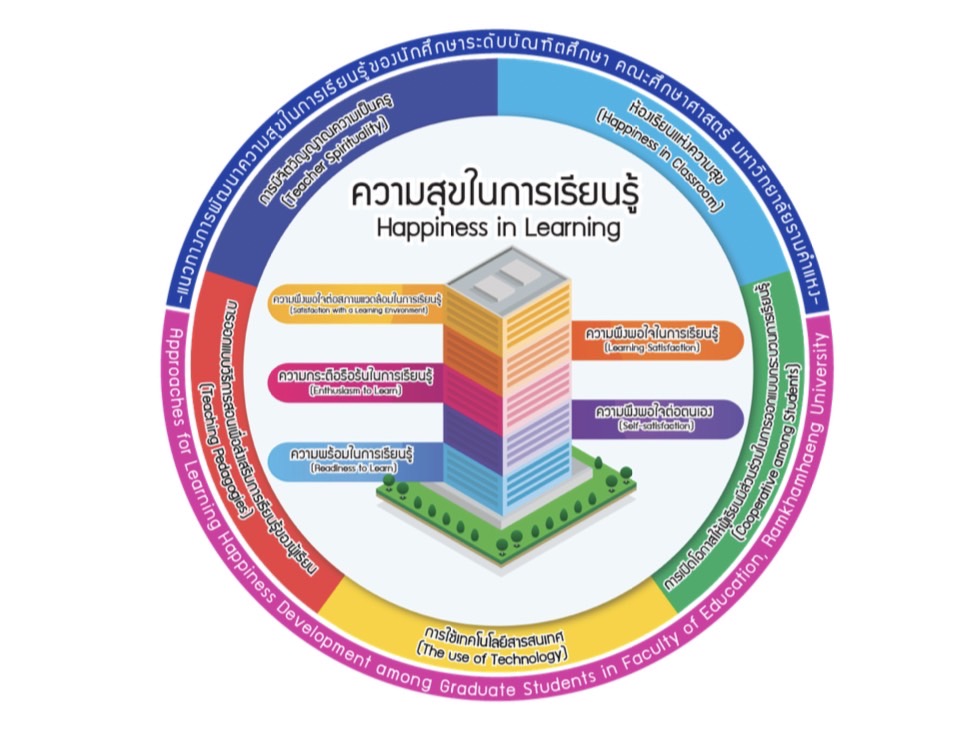แนวทางการพัฒนาความสุขในการเรียนรู้ของนักศึกษาระดับบัณฑิตศึกษา คณะศึกษาศาสตร์ มหาวิทยาลัยรามคำแหง
Main Article Content
บทคัดย่อ
การวิจัยครั้งนี้ เป็นการวิจัยแบบผสมผสาน โดยแบ่งเป็น 2 ระยะ คือ ระยะที่ 1 การวิจัยเชิงปริมาณ มีวัตถุประสงค์เพื่อศึกษาสภาพปัจจุบัน สภาพพึงประสงค์ และความต้องการจำเป็นของความสุขในการเรียนรู้ของนักศึกษาระดับบัณฑิตศึกษา คณะศึกษาศาสตร์ มหาวิทยาลัยรามคำแหง กลุ่มตัวอย่าง คือ นักศึกษาระดับบัณฑิตศึกษาฯ ปีการศึกษา 2566 จำนวน 217 คน จากนั้นทำการสุ่มแบบหลายขั้นตอน เครื่องมือที่ใช้เป็นแบบสอบถามมาตราส่วนประมาณค่า 5 ระดับ ระยะที่ 2 การวิจัยเชิงคุณภาพ มีวัตถุประสงค์เพื่อหาแนวทางการพัฒนาความสุขในการเรียนรู้ของนักศึกษาระดับบัณฑิตศึกษา คณะศึกษาศาสตร์ มหาวิทยาลัยรามคำแหง กลุ่มผู้ให้ข้อมูล คือ อาจารย์ และนักศึกษาระดับบัณฑิตศึกษา คณะศึกษาศาสตร์ มหาวิทยาลัยรามคำแหง จำนวน 9 คน เครื่องมือที่ใช้เป็นแบบสัมภาษณ์แบบมีโครงสร้าง ผลการวิจัยพบว่า สภาพปัจจุบัน สภาพพึงประสงค์ และความต้องการจำเป็นของความสุขในการเรียนรู้ของนักศึกษาระดับบัณฑิตศึกษา คณะศึกษาศาสตร์ มหาวิทยาลัยรามคำแหง โดยภาพรวมและรายด้าน อยู่ในระดับมาก โดยองค์ประกอบที่มีความต้องการจำเป็นสูงสุด คือ ความพึงพอใจต่อสภาพแวดล้อมในการเรียนรู้ รองลงมาคือ ความกระตือรือร้นในการเรียนรู้ ความพึงพอใจต่อตนเอง ความพร้อมในการเรียนรู้ และความพึงพอใจในการเรียนรู้ ตามลำดับ และแนวทางการพัฒนาความสุขในการเรียนรู้ของนักศึกษาระดับบัณฑิตศึกษา คณะศึกษาศาสตร์ มหาวิทยาลัยรามคำแหง ประกอบด้วย ห้องเรียนแห่งความสุข การเปิดโอกาสให้ผู้เรียนมีส่วนร่วมในการออกแบบกระบวนการเรียนรู้ การใช้เทคโนโลยีสารสนเทศ การออกแบบวิธีการสอนเพื่อส่งเสริมการเรียนรู้ของผู้เรียน และการมีจิตวิญญาณความเป็นครู
Downloads
Article Details

อนุญาตภายใต้เงื่อนไข Creative Commons Attribution-NonCommercial-NoDerivatives 4.0 International License.
The authors are solely accountable for the ideas and recommendations articulated in the articles published in The LEAD Journal RU. Should there be any inaccuracies, the authors accept full responsibility for such errors.
Moreover, the Editorial Board, Editorial Team, and Committee of The LEAD Journal RU are committed to maintaining the integrity of the principles reflected in the authors' contributions.
Consequently, Ramkhamhaeng University, the Editorial Board, Editorial Team, and Editors shall not be held liable for any outcomes arising from the authors' presentation of their ideas and recommendations within The LEAD Journal RU.
เอกสารอ้างอิง
Bangun, Y. R., Pritasari, A., Widjaja, F. B., Wirawan, C., Wisesa, A. and Ginting, H. (2021). Role of Happiness: Mediatiing Digital Technology and Job Performance among Lecturers. Frontiers in Psychology, https://www.frontiersin.org/journals/psychology/articles/10.3389/fpsyg.2021.593155/full
Chanyanuvat, A., Han, W. and Xuexia, S. (2019). How to Help Students Learn with Happiness. Proceeding of RSU International Research Conference 2019, 808-816.
Clap, S. (2020). Peaceful and Happy Schools: How to Build Positive Learning Environments. Journal of Elementary Education, 12(4), 311-320.
Cohen, L., Manion, L. and Morrison, K. (2018). Research Methods in Education (8th ed.). London: Routledge.
Committee Announcement on Educational Standards: Criteria for Graduate-level Curriculum Standards B.E. 2022. (2023). Thai Government Gazette, 139, S212, 21-34. [In Thai]
Helliwell, J. F., Layard, R., Sachs, J. and Neve, J. E. D. (2020). World Happiness Report 2020. New York: Sustainable Development Solutions Network, Gallup World Poll.
Humaira, R. (2024). An Analysis of Teachers’ Pedagogical Competence in Using Technology for Learners. Thesis, Faculty of Education and Teacher Training, Ar-rainy State Islamic University.
Jamebozorg, Z., Jafarkhai, F. and Salimi, M. (2017). Designing a Happy Learning Environment in Schools and Investigating Its Relationship with Stress and Mental Health. Quarterly of Clinical Psychology Studies, 7(28), 121-133.
Joseph, D. (2019). Fostering a Happy Positive Learning Environment for Generalist Pre-service Teachers: Building Confidence that Promotes Wellbeing. British Journal of Music Education, 36(2), 183-196.
Ionescu-Felega, L., Ionescu, B. and Stoica, O. C. (2022). The Impact of Digitalization on Happiness: A European Perspective. Mathematics, https://doi.org/10.3390/math10152766
Laosum, T. (2023). Development of Indicators of Happiness in Learning of Thai Open University Students. Asian Association Open University Journal, 18(1), 61-77.
Mendo-Lazaro, S., Leon-del-Barco, B., Polo-del-Rio, M-I. and Lopez-Ramos, V. M. (2022). The Impact of Cooperative Learning on University Students' Academic Goals. Frontiers in Psychology, https://doi.org/10.3389/fpsyg.2021.787210
Noddings, N. (2003). Happiness and Education. New York: Cambridge University Press.
Paridinova, B., Sapartayeva, L., Tungatova, N., Tulepbergenovan, A. and Kassymbekova, M. (2023). Future Teachers' Spiritual Worldview Formation Factors. Education Research International, https://doi.org/10.1155/2023/9972903
Piatanom, P., Chongkhlaiklang, S., Thongkamhaeng, K., and Kotcharat, T. (2023). Happiness and Learning Experiences for Thai Children vs the Participation Management of Thailand Educational System. Shanlax International Journal of Education, 11(S1-Oct), 141-144. http://doi.org/10.34293/education.v11iS1-Oct.6675
Ramkhamhaeng University. (2022). Internal Quality Assessment Report of Graduate Programs, Faculty of Education, Academic Year 2022. Bangkok: Faculty of Education, Ramkhamhaeng University. [In Thai]
Srisa-ard, B. (2017). Preliminary Research. Bangkok: Suriyasasn. [In Thai]
Wongwanit, S. (2019). Research on Assessing Necessary Needs (4th ed). Bangkok: Chulalongkorn University Press, Bangkok, Thailand. [In Thai]


